 W
W"Caldonia" is a jump blues song, first recorded in 1945 by Louis Jordan and his Tympany Five. A version by Erskine Hawkins, also in 1945, was described by Billboard magazine as "rock and roll", the first time that phrase was used in print to describe any style of music.
 W
W"(Do the) Mashed Potatoes" is a rhythm and blues instrumental. It was recorded by James Brown with his band in 1959 and released as a two-part single in 1960. For contractual reasons the recording was credited to "Nat Kendrick and the Swans".
 W
W"Doing It to Death", also known as "Gonna Have a Funky Good Time", is a funk song recorded by The J.B.'s featuring James Brown. A 10-minute, two-part version of "Doing It to Death" was included on a J.B.'s album of the same name. The complete, unedited and nearly 13-minute-long original recording of the song was first issued on the 1995 J.B.'s compilation Funky Good Time: The Anthology. Performances of the song also appear on the albums Live at Chastain Park and Live at the Apollo 1995.
 W
W"Funky Drummer" is a single released by James Brown in 1970. Its drum break, improvised by Clyde Stubblefield, is one of the most frequently sampled music recordings.
 W
W"Funky President " is a funk song by James Brown. Released as a single in 1974, it charted #4 R&B. It also appeared on the album Reality. According to Brown the "funky president" of the song's title was meant to refer to U.S. President Gerald Ford, who had succeeded Richard Nixon in the White House shortly before it was recorded.
 W
W"Get on the Good Foot" is a funk song performed by James Brown. It was released in 1972 as a two-part single that charted #1 R&B and #18 Pop. It also appeared on an album of the same name released that year. Partly due to the unwillingness of Brown's record labels to certify sales of his previous hits, "Get on the Good Foot" was his first gold record. Billboard ranked it as the No. 99 song for 1972.
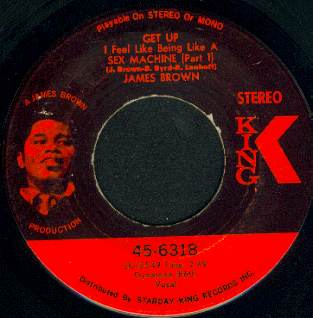 W
W"Get Up Sex Machine" is a song recorded by James Brown with Bobby Byrd on backing vocals. Released as a two-part single in 1970, it was a no. 2 R&B hit and reached no. 15 on the Billboard Hot 100.
 W
W"Get Up Offa That Thing" is a song written and performed by James Brown. It was released in 1976 as a two-part single. It reached #4 on the R&B chart, briefly returning Brown to the Top Ten after a year's absence, and #45 on the Billboard Hot 100. Thanks to its chart success, the song became Brown's biggest hit of the late 1970s. The song's lyrics urge listeners to "Get up offa that thing / and dance 'til you feel better." Due to his troubles with the IRS for failure to pay back taxes, Brown credited authorship of the song to his wife Deidre and their daughters, Deanna and Yamma Brown.
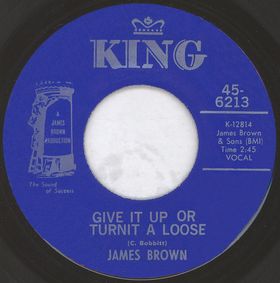 W
W"Give It Up or Turnit a Loose" is a funk song recorded by James Brown. Released as a single in 1969, the song was a #1 R&B hit and also made the top 20 pop singles chart. "Give It Up or Turnit a Loose" appeared as an instrumental on the Ain't It Funky (1970) album, removing Brown's vocals and adding guitar overdubs, while the vocal version was released onto Soul Classics (1972).
 W
W"Good Rocking Tonight" was originally a jump blues song released in 1947 by its writer, Roy Brown and was covered by many recording artists. The song includes the memorable refrain, "Well I heard the news, there's good rocking tonight!" The song anticipated elements of rock and roll music. In fact, some reviewers state that Brown's version, or Wynonie Harris', is one of the contenders for the title of "first rock'n'roll record".
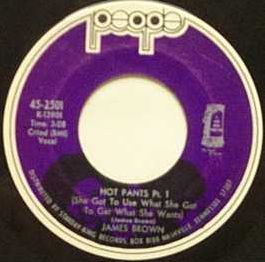 W
W"Hot Pants " is a funk song by James Brown. Brown recorded the song in 1971 and released it that year as a three-part single on his People Records label, which was then distributed by his primary label King. It was a number-one R&B hit and reached number fifteen on the Billboard Hot 100 pop chart in the U.S. along with reaching number ten on the Cashbox magazine charts. "Hot Pants" was Brown's final release under King's purview before he moved to Polydor Records. The song's lyrics are an ode to the captivating power of the title garment, which members of the band first saw on their 1970 European tour.
 W
W"I Don't Mind" is a rhythm and blues song written by James Brown and performed by Brown and the Famous Flames. Its unusual chord progression – in Brown's words, it "opens with a 13, goes down to a C9, then goes to a G7 and to the A7" – prompted objections during the recording session from producer Gene Redd, who considered it musically "wrong". Released as a single in 1961, it reached number four in the R&B Billboard charts and number 47 in the Pop Billboard charts. Brown and the Flames also performed it on their 1963 album Live at the Apollo.
 W
W"I Got the Feelin'" is a funk song by James Brown. Released as a single in 1968, it reached No. 1 on the R&B chart and #6 on the pop chart. It also appeared on a 1968 album of the same name.
 W
W"I Got You " is a song by American singer James Brown. First recorded for the album Out of Sight and then released in an alternate take as a single in 1965, it was his highest charting song and is arguably his best-known recording.
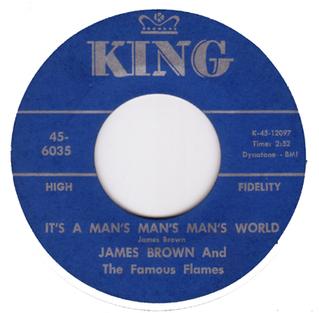 W
W"It's a Man's Man's Man's World" is a song written by James Brown and Betty Jean Newsome. Brown recorded it on February 16, 1966, in a New York City studio and released it as a single later that year. It reached No. 1 on the Billboard R&B chart and No. 8 on the Billboard Hot 100. Its title is a word play on the 1963 comedy film It's a Mad, Mad, Mad, Mad World.
 W
W"Kansas City" is a rhythm and blues song written by Jerry Leiber and Mike Stoller in 1952. First recorded by Little Willie Littlefield the same year, the song later became a chart-topping hit when it was recorded by Wilbert Harrison in 1959. "Kansas City" is one of Leiber and Stoller's "most recorded tunes, with more than three hundred versions", with several appearing in the R&B and pop record charts.
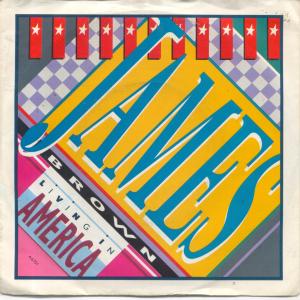 W
W"Living in America" is a 1985 song composed by Dan Hartman and Charlie Midnight and performed by James Brown. It was released as a single in 1985 and reached number 4 on the Billboard Hot 100 chart. The song entered the Billboard Top 40 on January 11, 1986, and remained on the chart for 11 weeks. It also became a top five hit in the United Kingdom, peaking at number 5 on the UK Singles Chart; it was his only top 10 single in the UK. It was his first Top 40 hit in ten years on the US pop charts, and it would also be his last. In 1987, it was nominated for a Grammy Award for Best R&B Song and won Brown a Grammy Award for Best Male R&B Vocal Performance.
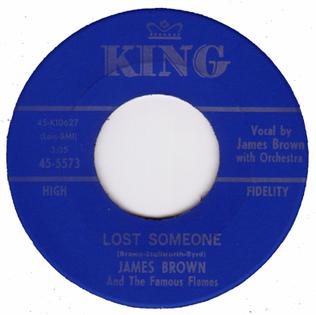 W
W"Lost Someone" is a song recorded by James Brown in 1961. It was written by Brown and Famous Flames members Bobby Byrd and Baby Lloyd Stallworth. Like "Please, Please, Please" before it, the song's lyrics combine a lament for lost love with a plea for forgiveness. The single was a #2 R&B hit and reached #48 on the pop chart. According to Brown, "Lost Someone" is based on the chord changes of the Conway Twitty song "It's Only Make Believe".
 W
W"Make It Funky" is a jam session recorded by James Brown with The J.B.'s. It was released as a two-part single in 1971, which reached No. 1 on the U.S. R&B chart and #22 on the U.S. Pop chart.
 W
W"Mother Popcorn " is a song recorded by James Brown and released as a two-part single in 1969. A #1 R&B and #11 Pop hit, it was the highest-charting of a series of recordings inspired by the popular dance the Popcorn which Brown made that year, including "The Popcorn", "Lowdown Popcorn", and "Let a Man Come In and Do the Popcorn".
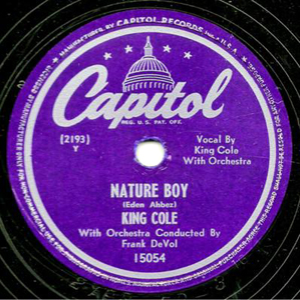 W
W"Nature Boy" is a song first recorded by American jazz singer Nat King Cole. It was released on March 29, 1948, as a single by Capitol Records, and later appeared on the album, The Nat King Cole Story. The song was written in 1947 by eden ahbez and is partly autobiographical. It is a tribute to ahbez's mentor Bill Pester, who had originally introduced him to Naturmensch and Lebensreform philosophies, which ahbez practiced. When Cole was performing in 1947 at the Lincoln Theater, ahbez wanted to present the song to him, but was ignored. He left the copy with Cole's valet, and from him the singer came to know of "Nature Boy". After receiving appreciation for his performance of the song, Cole wanted to record it but needed consent from the writer. Eventually, he tracked down ahbez.
 W
W"Night Time Is the Right Time" or "The Right Time" is a rhythm and blues song recorded by American musician Nappy Brown in 1957. It draws on earlier blues songs and has inspired many subsequent versions, including hits by Ray Charles, Rufus and Carla, and James Brown.
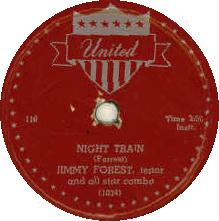 W
W"Night Train" is a twelve-bar blues instrumental standard first recorded by Jimmy Forrest in 1951.
 W
W"Out of Sight" is a rhythm and blues song recorded by James Brown in 1964. A twelve-bar blues written by Brown under the pseudonym "Ted Wright", the stuttering, staccato dance rhythms and blasting horn section riffs of its instrumental arrangement were an important evolutionary step in the development of funk music. In his 1986 autobiography Brown wrote that "Out of Sight" was another beginning, musically and professionally. My music - and most music - changed with "Papa's Got a Brand New Bag", but it really started on "Out of Sight" ... You can hear the band and me start to move in a whole other direction rhythmically. The horns, the guitars, the vocals, everything was starting to be used to establish all kinds of rhythms at once... I was trying to get every aspect of the production to contribute to the rhythmic patterns.
 W
W"Papa's Got a Brand New Bag" is a song written and recorded by James Brown. Released as a two-part single in 1965, it was Brown's first song to reach the Billboard Hot 100 Top Ten, peaking at number eight, and was a number-one R&B hit, topping the charts for eight weeks. It won Brown his first Grammy Award, for Best Rhythm & Blues Recording.
 W
W"The Payback" is a funk song by James Brown, the title track from his 1973 album of the same name. The song's lyrics, originally written by trombonist and bandleader Fred Wesley but heavily revised by Brown himself soon before it was recorded, concern the revenge he plans to take against a man who betrayed him. The song is notable for its sparse, open arrangement and its use of wah-wah guitar – a relative rarity in Brown's previous funk recordings. Released as a two-part single in February 1974, it was the first in an unbroken succession of three singles by Brown to reach #1 on the R&B charts that year – the last chart-toppers of his career. It also peaked at number 26 on the Billboard Hot 100. It was his second, and final, single to be certified gold by the RIAA.
 W
W"Please, Please, Please" is a rhythm and blues song performed by James Brown and The Famous Flames. Written by Brown and Johnny Terry, with music arrangement by Belford "Sinky" Hendricks, and released as a single on Federal Records in 1956, it reached No. 6 on the R&B charts. The group's debut recording and first chart hit, it has come to be recognized as their signature song.
 W
W"Say It Loud – I'm Black and I'm Proud" is a funk song performed by James Brown and written with his bandleader Alfred "Pee Wee" Ellis in 1968. The first part of the song was arranged by Belford "Sinky" Hendricks. It was released as a two-part single which held the number-one spot on the R&B singles chart for six weeks, and peaked at number ten on the Billboard Hot 100. Both parts of the single were later included on James Brown's 1968 album A Soulful Christmas and on his 1969 album sharing the title of the song. The song became an unofficial anthem of the Black Power movement.
 W
W"She's the One" is a rhythm and blues song written by Hank Ballard and first recorded by his group The Midnighters. Originally issued on Federal Records as the B-side of their #1 R&B hit "Annie Had a Baby", it received an A-side release later the same year.
 W
W"Spinning Wheel" is a song from 1968 by the band Blood, Sweat & Tears, written by Canadian lead vocalist David Clayton-Thomas and appearing on their eponymous album.
 W
W"Super Bad", originally titled Call Me Super Bad, is a 1970 song by James Brown. Originally released as a three-part single, it went to #1 on the R&B chart and number 13 on the Billboard Hot 100. The song's lyrics include the refrain "I've got soul and I'm super bad." The positive use of the word "bad" is an example of linguistic reappropriation, which Brown had done before in "Say It Loud - I'm Black and I'm Proud".
 W
W"Then You Can Tell Me Goodbye" is a song written by John D. Loudermilk. It was first released in 1962 by Don Cherry, as a country song and again as a doo-wop in 1967 by the group The Casinos on its album of the same name, and was a number 6 pop hit that year. The song has since been covered by Eddy Arnold, whose version was a number 1 country hit in 1968, and by Neal McCoy, whose version became a Top 5 country hit in 1996.
 W
W"Think " is a funk song recorded by Lyn Collins and released as a single on James Brown's People Records in 1972. The recording was produced by Brown and features instrumental backing from his band The J.B.'s. It was the title track of Collins' 1972 debut album. The song is very popular for its raw drumbeat dressed with tambourine and multiple background vocals, which suggest the song was recorded altogether in one take. It peaked at No. 9 on the Billboard Best Selling Soul Singles chart and No. 66 on the Hot 100. Owing to the composition, it became a fan favourite and has been featured on various compilation albums posthumously. In the closing lyrics, Collins sings lines from "Think", which shows that this song was one of the few adaptations of the 5 Royales song that Brown loved to do.
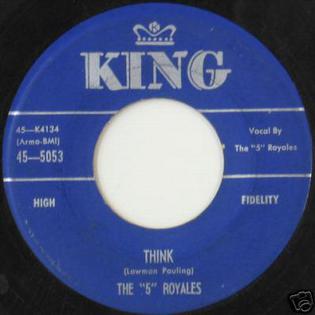 W
W"Think" is a rhythm and blues song written by Lowman Pauling and originally recorded by his group The "5" Royales. Released as a single on King Records in 1957, it was a national hit and reached number nine on the U.S. R&B chart.
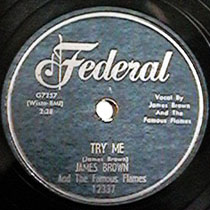 W
W"Try Me", titled "Try Me " in its original release, is a song, arrangement by Belford Hendricks, recorded by James Brown and The Famous Flames in 1958. It was a #1 R&B hit and charted #48 Pop - the group's first appearance on the Billboard Hot 100. It was Brown and the Flames' second charting single, ending a two-year dry spell after the success of "Please, Please, Please".
 W
W"Unity" is a song recorded by Afrika Bambaataa and James Brown as a duet in 1984. It was the first recording in which Brown collaborated with a performer associated with hip hop, a then-new idiom heavily influenced by Brown's own funk music. The record's title and its cover showing the two performers clasping hands express solidarity between the two styles. The song's music is similar in its structure to Brown's own funk songs of the late 1960s and 1970s, but uses the drum machine and keyboard-generated timbres of electro. The song's rapped lyrics are on the themes of "Peace, unity, love, and having fun". The single charted #87 R&B.
 W
W"Your Cheatin' Heart" is a song written and recorded by country music singer-songwriter Hank Williams in 1952, later regarded as one of country's most important standards. Country music historian Colin Escott writes that "the song – for all intents and purposes – defines country music." Williams was inspired to write the song while driving with his fianceé from Nashville, Tennessee, to Shreveport, Louisiana. After describing his first wife Audrey Sheppard as a "Cheatin' Heart", he dictated in minutes the lyrics to Billie Jean Jones. Produced by Fred Rose, Williams recorded the song on his last session at Castle Records in Nashville, Tennessee, on September 23.